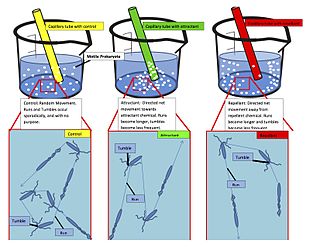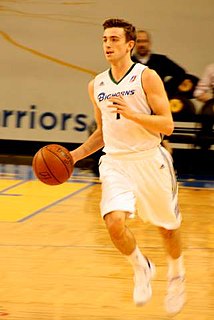Related Research Articles

Chemotaxis is the movement of an organism in response to a chemical stimulus. Somatic cells, bacteria, and other single-cell or multicellular organisms direct their movements according to certain chemicals in their environment. This is important for bacteria to find food by swimming toward the highest concentration of food molecules, or to flee from poisons. In multicellular organisms, chemotaxis is critical to early development and subsequent phases of development as well as in normal function and health. In addition, it has been recognized that mechanisms that allow chemotaxis in animals can be subverted during cancer metastasis. The aberrant chemotaxis of leukocytes and lymphocytes also contribute to inflammatory diseases such as atherosclerosis, asthma, and arthritis.

Escherichia coli, also known as E. coli, is a Gram-negative, facultative anaerobic, rod-shaped, coliform bacterium of the genus Escherichia that is commonly found in the lower intestine of warm-blooded organisms (endotherms). Most E. coli strains are harmless, but some serotypes (EPEC, ETEC etc.) can cause serious food poisoning in their hosts, and are occasionally responsible for food contamination incidents that prompt product recalls. The harmless strains are part of the normal microbiota of the gut, and can benefit their hosts by producing vitamin K2, (which helps blood to clot) and preventing colonisation of the intestine with pathogenic bacteria, having a symbiotic relationship. E. coli is expelled into the environment within fecal matter. The bacterium grows massively in fresh fecal matter under aerobic conditions for 3 days, but its numbers decline slowly afterwards.

Richard Eimer Lenski is an American evolutionary biologist, a MacArthur "genius" fellow, a Hannah Distinguished Professor of Microbial Ecology at Michigan State University, and a member of the National Academy of Sciences. Lenski is best known for his still ongoing 33-year-old long-term E. coli evolution experiment, which has been instrumental in understanding the core processes of evolution, including mutation rates, clonal interference, antibiotic resistance, the evolution of novel traits, and speciation. He is also well known for his pioneering work in studying evolution digitally using self-replicating organisms called Avida.

Ronald D'Wayne Price is an American former professional basketball player and current scout for the Phoenix Suns. Price grew up in Friendswood, Texas and played college basketball for one year at Nicholls State and three years at Utah Valley State. Price was not drafted in the 2005 NBA draft and played for the Sacramento Kings from 2005 to 2008. Price then played for the Utah Jazz, Phoenix Suns, Portland Trail Blazers, Orlando Magic, and Los Angeles Lakers before returning to Phoenix for a second and final playing stint.
Julius Adler Ph.D. is an American biochemist. He has been an Emeritus Professor of biochemistry and genetics at the University of Wisconsin–Madison since 1997.

Carpobrotus, commonly known as pigface, ice plant, sour fig, Hottentot fig, and clawberry is a genus of ground-creeping plants with succulent leaves and large daisy-like flowers. The name refers to the edible fruits. It comes from the Ancient Greek karpos "fruit" and brotos "edible".

Burkholderia cenocepacia is a species of Gram-negative bacteria that is common in the environment, can form a biofilm with itself, is resistant to many antibiotics and may cause disease in plants.

Escherichia coli O104:H21 is a rare serotype of Escherichia coli, a species of bacteria that lives in the lower intestines of mammals. Although there are many serotypes of E. coli, when in animals, there are benefits or do not cause disease. Some serotypes of E. coli have been recognized as pathogenic to humans, e.g. E. coli O157:H7, E. coli O121 and E. coli O104:H21.
Mycoplasma laboratorium or Synthia refers to a synthetic strain of bacterium. The project to build the new bacterium has evolved since its inception. Initially the goal was to identify a minimal set of genes that are required to sustain life from the genome of Mycoplasma genitalium, and rebuild these genes synthetically to create a "new" organism. Mycoplasma genitalium was originally chosen as the basis for this project because at the time it had the smallest number of genes of all organisms analyzed. Later, the focus switched to Mycoplasma mycoides and took a more trial-and-error approach.

Ballpark station is a light rail station in the People's Freeway neighborhood of Salt Lake City, Utah, in the United States, served by all three lines of Utah Transit Authority's TRAX light rail system. The Blue Line provides service from Downtown Salt Lake City to Draper. The Red Line provides service from the University of Utah to the Daybreak Community of South Jordan. The Green Line provides service from the Salt Lake City International Airport to West Valley City.

Richard Bruce Parkinson is a British Egyptologist and academic. He is Professor of Egyptology at the University of Oxford and a fellow of The Queen's College, Oxford. Until December 2013 he was a curator in the Department of Ancient Egypt and Sudan, British Museum.

James Marsh was an American professional basketball player who competed in the National Basketball Association (NBA) for one season. He played college basketball at the University of Southern California, and played professionally for the Portland Trail Blazers of the NBA.

David Stockton is an American professional basketball player for the Memphis Hustle of the NBA G League. He played college basketball for Gonzaga University and is the son of Naismith Hall of Famer John Stockton.
Keiichi Itakura is an organic chemist and a Professor in the Department of Molecular and Cellular Biology at the Beckman Research Institute at City of Hope National Medical Center.
Matthew William Parkinson is an English cricketer who plays for Lancashire. He made his international debut for the England cricket team in November 2019. His twin brother, Callum, plays cricket for Leicestershire.

Nonpathogenic organisms are those that do not cause disease, harm or death to another organism and is usually used to describe bacteria. It describes a property of a bacterium - its ability to cause disease. Most bacteria are nonpathogenic. It can describe the presence of non-disease causing bacteria that normally reside on the surface of vertebrates and invertebrates as commensals. Some nonpathogenic microorganisms are commensals on and inside the body of animals and are called microbiota. Some of these same nonpathogenic microorganisms have the potential of causing disease, or being pathogenic if they enter the body, multiply and cause symptoms of infection. Immunocompromised individuals are especially vulnerable to bacteria that are typically nonpathogenic but because of a compromised immune system, disease occurs when these bacteria gain access to the body's interior. Genes have been identified that predispose disease and infection with nonpathogenic bacteria by a small number of persons. Nonpathogenic E.coli strains normally found in the gastrointestinal tract have the ability to stimulate the immune response in humans, though further studies are needed to determine clinical applications.

Neisseria polysaccharea was described in 1983 and is characterized by its ability to produce acid from glucose and maltose and polysaccharide from sucrose. It is nonpathogenic. Strains of this species were previously identified as nontypable strains of N. meningitidis. Strains of N. polysaccharea also may have been misidentified previously as N. subflava because their ability to produce polysaccharide from sucrose was not determined. Other Neisseria species have been be misidentified as N. polysaccharea by acid production tests and supplemental tests.
Frederick C. Neidhardt (1931-2016) was an American microbiologist who was on the faculty at Purdue University and the University of Michigan. He is known for his work on the physiology and biochemistry of bacterial growth and for early work in bacterial proteomics.
Roger Alan Horn is an American mathematician specializing in matrix analysis. He was Research Professor of mathematics at the University of Utah. He is known for formulating the Bateman–Horn conjecture with Paul T. Bateman on the density of prime number values generated by systems of polynomials. His books Matrix Analysis and Topics in Matrix Analysis, co-written with Charles R. Johnson, are standard texts in advanced linear algebra.
Holly Parkinson-Hasler is a former professional tennis player from the United States.
References
- ↑ "John S. "Sandy" Parkinson". utah.edu. Retrieved February 27, 2017.CS1 maint: discouraged parameter (link)
- ↑ "John S. Parkinson" . Retrieved February 27, 2017.CS1 maint: discouraged parameter (link)
- ↑ "Bacterial Chemotaxis: a New Player in Response Regulator Dephosphorylation" (PDF).